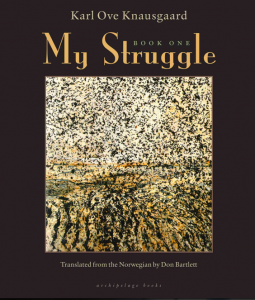 It takes something approaching egomania to write a six-volume, 3500 page memoir when you’re barely 40 years old, and a rebellious indifference to propriety to borrow your title from one of history’s biggest egomaniacs, but the self-portrait emerging from Karl Ove Knausgaard’s My Struggle (Min Kamp, in his native Norwegian) has more to do with self-loathing than self-aggrandizing. The sheer brazenness of the project guaranteed it would attract notice independent of whether or not it was any good, but glowing early reviews, including encomiums from the likes of Zadie Smith and James Wood, have exposed Knausgaard’s most private thoughts and experiences to an international audience and seriously pissed off those friends and family, including his ex-wife, who unwittingly found themselves portrayed in the book, collateral damage in the author’s war for truth.
It takes something approaching egomania to write a six-volume, 3500 page memoir when you’re barely 40 years old, and a rebellious indifference to propriety to borrow your title from one of history’s biggest egomaniacs, but the self-portrait emerging from Karl Ove Knausgaard’s My Struggle (Min Kamp, in his native Norwegian) has more to do with self-loathing than self-aggrandizing. The sheer brazenness of the project guaranteed it would attract notice independent of whether or not it was any good, but glowing early reviews, including encomiums from the likes of Zadie Smith and James Wood, have exposed Knausgaard’s most private thoughts and experiences to an international audience and seriously pissed off those friends and family, including his ex-wife, who unwittingly found themselves portrayed in the book, collateral damage in the author’s war for truth.
With his life as his subject matter, Knausgaard begins his book with a brief and impersonal meditation on death and our societal obsession with denying its inevitability and omnipresence, and then abruptly – and jarringly – transitions into an an anecdote from his childhood involving his father, who quickly comes to dominate the book’s focus. The Knausgaard paterfamilias is a paradox, a cold, often cruel man who mingles his cruelties with just enough affection and professions of love to keep his two sons vacillating between fear and fawning approval-seeking. I am reminded of Kafka’s description of his father, who “took on the enigmatic quality that all tyrants have whose rights are based on their person and not on reason.” Unable to comprehend the true source of his father’s varying moods, the young Karl Ove cannot disavow responsibility for them, and we see with painful clarity the alienation and guilt this causes him.
For his commitment to truth, to representing events as they happened rather than through the prism of his present self, and for his expansiveness, Knausgaard has been called a modern Proust, and it’s difficult not to draw comparisons. My Struggle does have a kind of confessional quality to it, the laying bare of an otherwise private and withdrawn soul, but it wounds us by its familiarity. The adolescent struggle for identity is rendered with painful fidelity, as are the unrequited strivings for parental affection, and Knausgaard does an admirable job of showing how these two goals, individuality and acceptance, are often at odds with one another.
The first book, at least, more than delivers on the incredible promise of its publicity and has left me eager for the second book’s English paperback release later this summer.